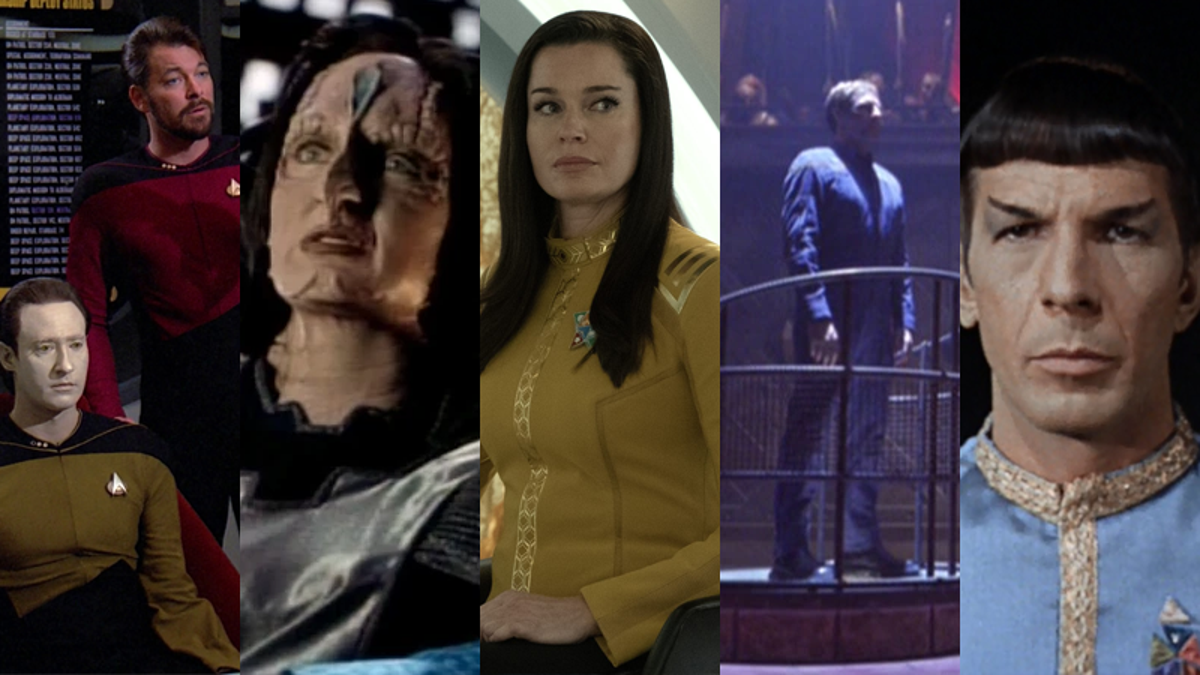Personally I would probably put “Devil’s Due” at number one, but I realized not everyone can have such a refined taste in Trek.
I have to say I was absolutely blown away by Ad Astra Per Aspera because it so clearly showed, but didn’t explicitly hammer in, the complicity of the majority and their complete lack of understanding of how laws can be applied separately to a minority group.
Pike said “put me on the stand and let me tell a story and we’ll get out of this mess” because it’s always worked for him to get out of rule-breaking. April became upset that it was so obviously pointed out how the law applies differently to him, and yet after his witness statement he was still stuck on “I didn’t get to tell a nice story about Una” as if that would have sorted everything out, because it’s always worked for him to get out of rule-breaking - even after it was shoved in his face how differently the law applied to him.
Even Chin-Riley herself started with “put me on the stand and let me tell a story and explain myself” because it always worked for her previously, because she had always been seen by the Federation as a member of the acceptable majority class, and she hadn’t yet come to terms with how that would no longer work now that she had been deemed “unacceptable” by society.
As far as sci-fi goes, this was an excellent sci-fi story. It parallels a current issue in society without explicitly calling it out, which allows people to reframe and re-consider their thinking without being subject to pre-existing biases. It also showed off so clearly how a “utopic society” is only utopic for those deemed acceptable. This is what I consider to be “excellent Star Trek”.
Absolutely this. Best part of the episode, for me, was the examination of April.
A) It’s a not uncommon legal tactic for the defence, to just mess shit up and cast doubt over the whole trial.
B) It, as you point out so well, laid out the morality of the issue and the cultural hurdles it was running into … the kicker being the judge’s statement at the end of the examination that it was all “stricken from the record”, which on the one hand made perfect legal sense, but on the other perfectly demonstrated how hard it is to even talk about the issue from an outsider’s perspective. All of which also gets back to A … Neera knew what she was doing and let it set the tone for what the trial was really about, even though it wouldn’t register legally, it would register in everyone’s guts, where she had the actual legal argument coming to stick the landing.
Not sure that I would rank TNG Measure of a Man or The Drumhead ahead of SNW Ad Astra Per Aspera.
Only rewatches and time will determine the final place of Ad Astra Per Aspera in the franchise, but I have a sense that it will become as significant or more than either of the TNG ones. While the decision was taken on the narrow application of an asylum provision for one individual, in terms of allegory, the episode echoes with the experiences of so very many marginalized groups and peoples.
I cried watching Measure of a Man. It’s a gift to humanity. But Ad Astra Per Aspera clearly overtakes it imo. It doesn’t ask just about the implications of the law, but about what it - and society, and its constituents - should aspire to be. It’s less about military codes and an individual’s selfishness (Maddox), telling a more universally applicable story still firmly entrenched in Trek lore.
I wonder if they balked at ranking Ad Astra Per Aspra higher because of that “recency bias” they mentioned. I agree - it’s an excellent, thoughtful episode.
Measure of a Man was groundbreaking but feels pretty dated to watch. Back when it aired, the idea that sentient AIs should be treated as humans was far from the mainstream. Today, we’ve seen so many sympathetic robots in pop culture (including, of course, Data) that the situation is reversed: the arguments aired against Data in this episode seem shockingly bigoted.
Imagine if the plot contrived to make Riker get up in front of the court to argue for slavery – even if he’s clearly labelled as playing devil’s advocate, it feels beyond the pale.
What about The First Duty?
The first duty of every Starfleet officer is to the truth, whether it’s scientific truth, or historical truth, or personal truth! It is the guiding principle on which Starfleet is based, and if you can’t find it within yourself to stand up and tell the truth about what happened, you don’t deserve to wear that uniform. I’m going to make this simple for you, Mr. Crusher; either you come forward and tell Admiral Brand what really took place, or I will.
Why do they need to be ranked?
In this specific instance, probably because people who write for websites need to put out a certain number of articles per week.
But also, I thought it was a fun perspective.
😊👍
That’s my feeling on it. They all have something to offer, and for the most part did a good job telling a story. It’s like comparing two nice bottles of scotch. Which is “best” depends on exactly what you’re looking at , and your mood. It’s also largely subjective. Pick one, and appreciate it for what it is.
😊👍
This is a really good and very Star Trek point, and thank you for pointing it out. It reminds me of Naomi Wildman telling Seven, “cooperation is more important than competition”.










